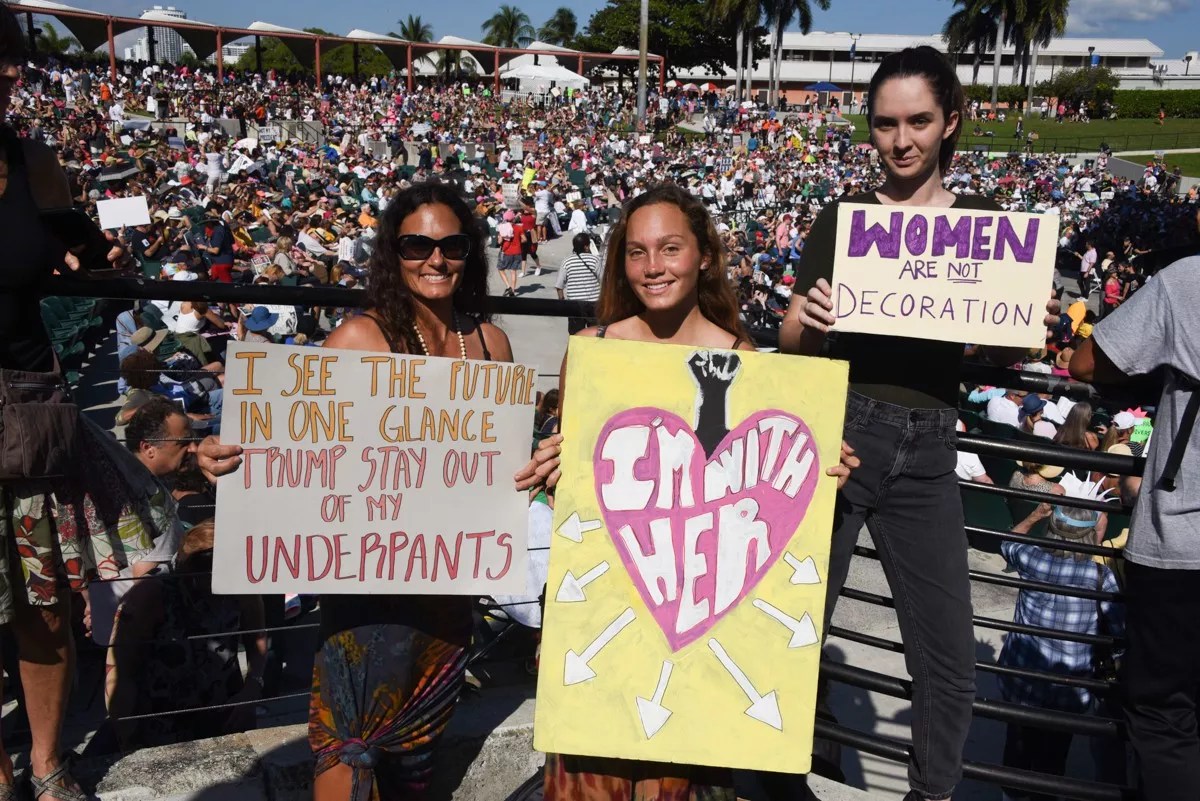
Photo by Michele Eve Sandberg

Audio By Carbonatix
“I marched the first time,” Sandy Oestreich says by phone from here home near St. Petersburg. Oestreich is
“There’s a right to vent emotions; I applaud that,” she says. “But the point always strains away, just like the Occupy movement did. Now the focus is on ‘What to do?’ I want those people to come work with us.”
The protesters, she says, should channel their anger at their local representatives and force them to ratify the Equal Rights Amendment to the U.S. Constitution.
“It’s stuck at 35,” Oestreich says. “We’ve been working on it slowly since then.”
Oestreich isn’t the only ERA advocate drumming up support this week: Multiple lawmakers held ERA rallies across the nation in the runup to this past Saturday’s march.
To change the U.S. Constitution, 38 states need to ratify an amendment before it becomes law. Fifteen state governments, including Georgia, Alabama, Arkansas, and Florida, have refused to ratify the ERA. (All of those states, save Arizona and Illinois, are in the South.)
The amendment’s text is simple: “Equality of rights under the law shall not be denied or abridged by the United States or by any State on account of sex.” To give you a sense of just how long women have been waiting for the ERA to pass, the idea was first proposed by famed abolitionist and women’s rights advocate Lucretia Mott, who was born in 1793 and died in 1880.
After the ERA came close to passing in the early 1980s, the bill’s momentum fell off almost entirely, Oestreich says. She began protesting in the 1970s, and since then, she says she’s traveled around the country, without pay, attempting to lobby state legislators to finally ratify the amendment. In the meantime, she’s worked as a university professor and as vice mayor of a Florida town. She says she resigned her vice mayorship in the 1980s after a friend reminded her that the ERA had not yet passed.
She asked New Times not to name the town, however,
“One time, before a town-hall meeting, one man in the audience came up and said, ‘You just signed your death warrant,'” she says. “Another time, I was run off the road in front of my house by a car with no headlights. But I’m not afraid of anything anymore.”
Oestreich says she gives at least 64 lectures to lawmakers nearly every fall, pleading with them to pass the ERA after nearly 100 years. She says she thinks both lawmakers and the public have forgotten that the fight over the ERA is still happening.
“The response from Florida lawmakers is, mostly, a yawn,” she says. She blames Republicans in the 15 non-ERA states, who she says have put up a steel barrier to prevent the ERA from passing.
“Almost all the Democratic legislators in Florida, for example, say they’ll cosponsor, no problem,” she says. “Once in a while, we get one Republican who will sponsor
If Republicans can’t be persuaded to vote for the ERA due to the basic idea that women shouldn’t be discriminated against and deserve civil rights, Oestreich says there’s an economic argument to pass the measure too. According to a host of national studies, states that pass equal-rights laws tend to see a 15 percent boost in gross domestic product growth and a drop in women’s poverty rates. The International Monetary Fund, the European Union, and the Organization for Economic Cooperation and Development all support equal-rights clauses.
“Uniquely, the ERA also requires no funding,” Oestreich says.
In the wake of Donald Trump’s inauguration, she says, women in her organization feel afraid for the future – and in response, she says, “major orgs seem to be pulling on their boots” and deciding it’s time to fight the Trump administration daily for the next four years.
“Many of us are afraid of the nation’s future, particularly for losing all the ground we’ve gained in terms of contraception, terminations of pregnancies, all that,” Oestreich says. She says her organization needs volunteers to continually reach out to lawmakers to beg them to pass the ERA. People who’d like to volunteer can contact Oestreich directly through her website.
“The thing I’ve been saying to lawmakers is this: I’m 82. don’t let me die before you pass an equal-rights amendment.”